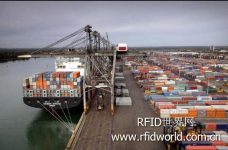
DP World adopts RFID system to improve operational efficiency in Australian container yard
[ad_1]
DP World, one of the world’s largest ocean container yard operators, now uses RFID technology in the three yards it operates in Australia. More than 2 million TEU containers are loaded into and out of these three yards by trucks every year. In order to improve safety and efficiency of vehicle entry and exit, and reduce queuing and congestion, the company installed RFID readers at the entrances and exits of all storage yards. In addition, DP World has provided truck operators with approximately 3,000 battery-powered RFID tags.
The company’s port Botany yard in Sydney has taken the lead in completing the installation of the RFID system, and the other two yards in Brisbane and Limantle are expected to be installed in the next six months.
DP World has operations in more than 50 ports in 25 countries, including China, India, France, Germany, Canada and India, and handles more than 46 million TEU containers each year. In Australia, the company also has storage yards in Melbourne and Adelaide ports.
Victoria Rose, DP World’s project coordinator in the Sydney area, said that DP World wanted to learn more about trucks entering and leaving the yard in order to improve operational efficiency. RFID technology can withstand the harsh weather conditions at the shipping container storage site, and is an ideal application technology.

DP World adopts RFID system to improve operational efficiency in Australian container yard
“In the future, the use of RFID to improve the upgradeability and functions of efficiency, as well as to speed up and optimize our customer service services, is the fundamental factor in our decision to adopt RFID technology,” Rose said. “We noticed that RFID can improve truck management and thus improve the efficiency of in and out. Reduce queues and congestion, simplify truck handling procedures, and prevent trucks from occupying public roads.”
By improving the efficiency of entry and exit, DP World can more effectively organize the pickup and placement of yard containers, speeding up the delivery of containers to customers.
Before adopting RFID, DP World convened several manufacturers to carry out a proof-of-concept test and confirmed the performance of their RFID software and hardware. “The main challenge facing RFID manufacturers is that we require a tag read rate of 99.5%,” Rose said. “Due to the application environment near the ocean and the impact of heavy vehicles entering and exiting, this system must be robust and durable to ensure its service life. “.
RFID tags were installed on the buffers of 400 trucks, and RFID readers were installed at the entrance and exit of the yard. Australian system integrator Ramp used Identec Solutions’ active Intelligent Long Range (ILR) technology to achieve a 100% read rate and won the project.
The operating frequency of Identec active tags is 915 MHz, using the company’s proprietary air interface protocol, and continuously sending its ID codes at preset time intervals. Then install Identec’s RFID readers and location tags at each entry and exit point to determine the exact location of the DP World truck. When the tag passes through a conductive coil connected to the location marker, the identification data is downloaded from the marker. The tag ID code and elapsed time are then broadcast and later read by a TLR reader.
The system software OnRamp IQ Beacon collects import and export reader data at a set time interval. The software filters the tags to read the data, and uses an HTTP request to send the information to the integration layer of DP World, so the reading is confirmed this time, and then sent to the operating system of the yard. The operating system then judges whether the truck arrives on time, which is very important in effectively organizing the transportation and placement of the container.
In addition, the system can also automatically provide other information: such as whether the truck has been booked by someone, whether it has the right to enter and exit, and finally, whether the truck is allowed to enter the port; thereby improving safety and speeding up the process of authorizing trucks to enter and exit the yard.
Identec also provides similar RFID systems for other shipping yards, including the Port of Georgia. In addition, DP World had previously adopted Identec Solutions technology in Middle Eastern ports.
According to Rose, DP World spent a lot of time evaluating the usability of RFID hardware and software systems, but once the proof-of-concept testing was completed, the Port Botany yard installation took only a few weeks. Before the system was officially launched, the company also spent a month to carry out terminal-to-terminal testing and labeling trucks.
After the RFID system has been installed at the yards in Brisbane and Limantle, DP World will also consider extending the system to Melbourne and Adelaide ports.
[ad_2]



